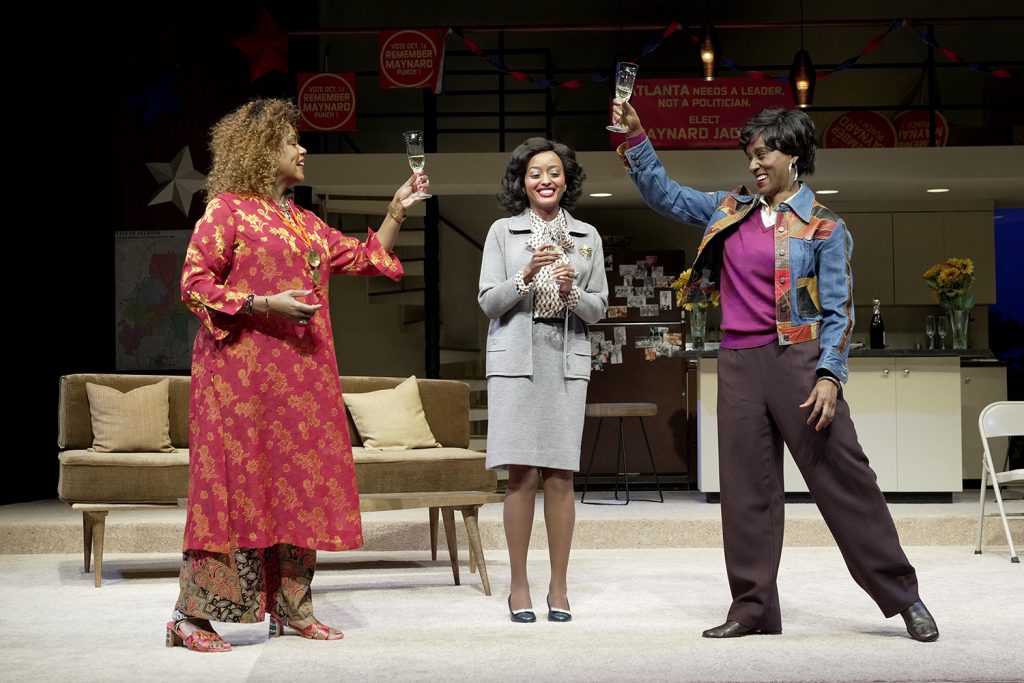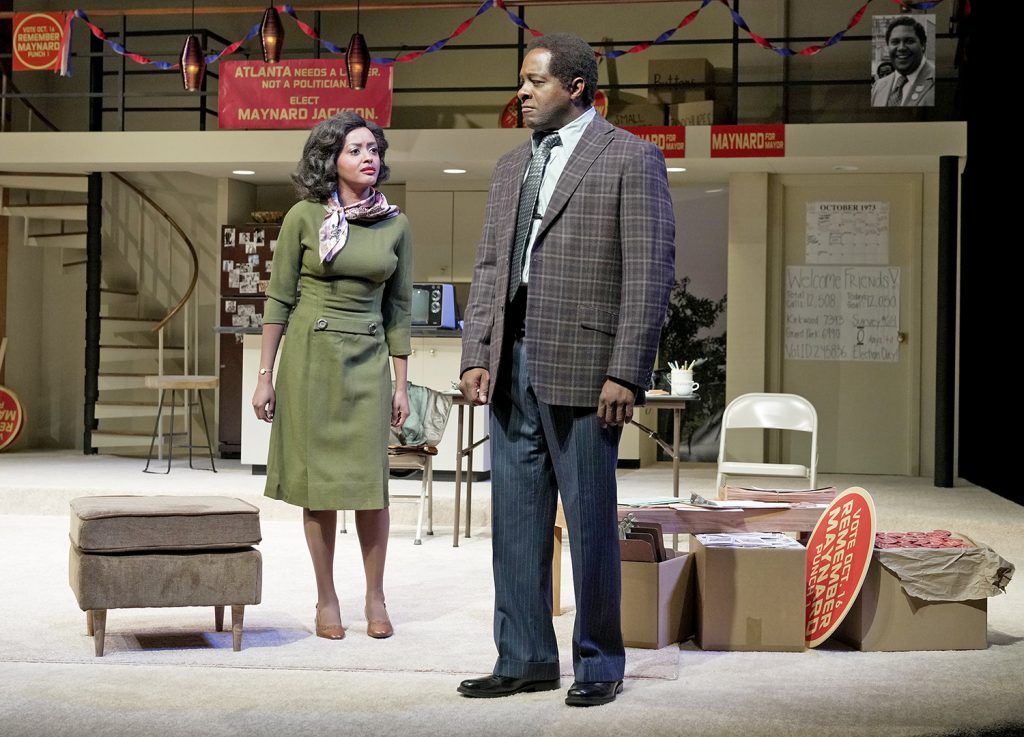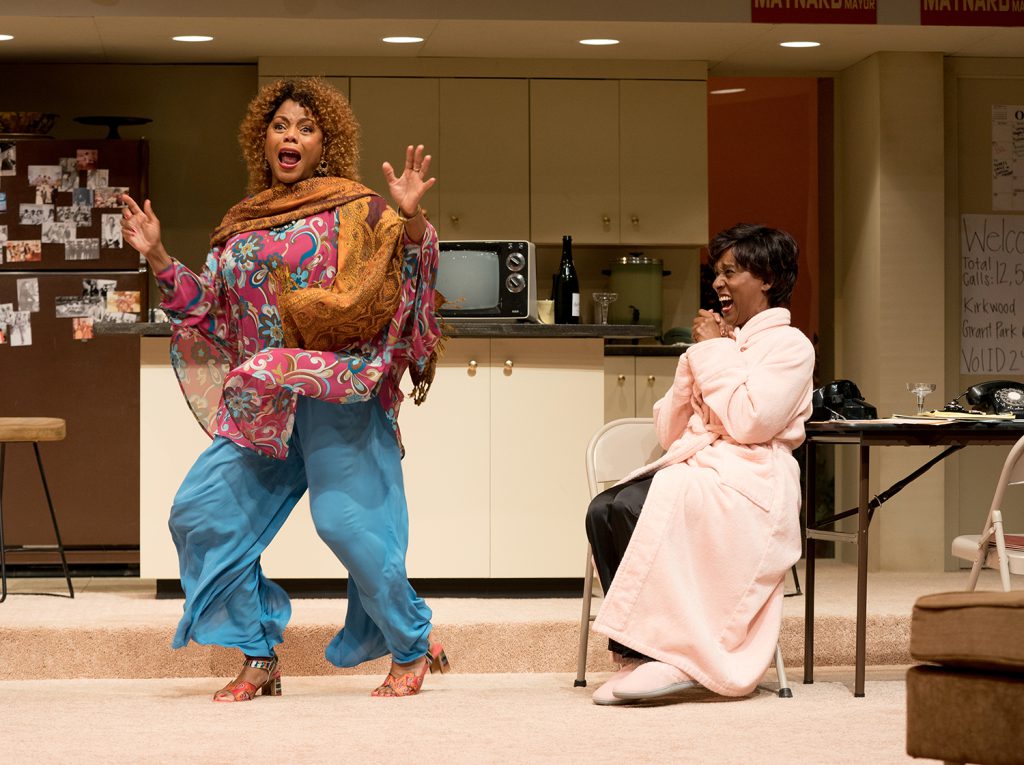
By Eric Marchese | Special to the NB Indy
In 1973, years before writing her first play, Pearl Cleage was on Maynard Jackson’s campaign staff, helping him to win election as mayor of Atlanta. As Jackson was the first black mayor of a major American city, he and his staff became part of American political history.
Cleage stayed on as Jackson’s press secretary and speechwriter. Nearly 40 years later, she used her experiences as the subject of a play.
“What I Learned in Paris,” though, isn’t about Jackson. Instead, the mayoral candidate’s campaign and victory form the backdrop for a story about those whose tireless efforts got him elected while advancing the cause of civil rights.
Now, Cleage’s engaging 2012 comedy-drama hits South Coast Repertory, helmed by Lou Bellamy. One of the most prominent black directors and producers in the U.S., Bellamy returns to SCR after directing the January 2020 production of Donja R. Love’s “Fireflies.”
The Segerstrom Stage production spotlights playwright Cleage’s intelligence, perception and wit while showing how difficult it is for anyone being carried along by historical events to put their personal lives on hold.
“What I Learned in Paris” picks up during the wee hours of election night at a midtown condo, the temporary home base of Jackson’s political consultant, Lena Jefferson (Celeste M. Cooper).
The elated staff is celebrating Jackson’s victory, realizing that black life in Atlanta is about to undergo drastic change. The shift in political power is also about to impact gender interactions for all: Women everywhere were just starting to come into their own, and playwright Cleage uses romantic interactions among four of her five characters to examine this now-shifting dynamic.

Attorney J.P. Madison (A. Russell Andrews), a major Jackson campaign wheel, has recently married the much younger Ann (Kaye Winks). Things get interesting when we learn that during their recent trip to Las Vegas, they didn’t actually get married.
More intrigue brews when we learn J.P.’s junior law firm partner, John Nelson (James T. Alfred), is desperately in love with Ann. The pot is further stirred with the arrival of J.P.’s first wife Eve (Erika LaVonn) after two years in San Francisco.
“Evie” (as she’s known) returns home to Atlanta, “the new capital of black America,” with plans that include buying property in a mostly white enclave.
Cleage spins and milks various scenarios for maximum comedic value and intrigue, even while lending social commentary: J.P. views Evie with alarm and sees her as disruptive of his plans to enter the political arena, and few can resist the delicious irony of older ex-wife Evie helping, and passing along wisdom to, Ann, her ex’s new wife.
“Paris,” though, is so much more than the “rom-com” label suggests. Cleage works in a number of intriguing comic wrinkles but also plumbs larger concerns, making the play far more than simply an uproarious, lighthearted comedy.
Cleage deftly juggles the story’s crisscrossing storylines, plotlines and themes, her script brimming with witty lines artfully interwoven to yield an enjoyably natural dialogue flow.
The play’s characters try in to put their lives on hold for their work, only to discover that no one can prevent the flow of events, whether personal or historical, from occurring.
The title refers to a long-ago, long-awaited visit to Paris for J.P. and Evie – but J.P. stays behind to work. Evie travels alone, leading to a life-changing epiphany about how women can live and even thrive on their own, freed from subjugating their needs to those of men.
Cleage’s script’s and SCR’s cast exhibit lifelike, natural rhythms that makes us feel we’re watching real events as they unfold. Bellamy’s actors are dynamic, vigorous, and playfully nonchalant, generating an authentic sense of black culture from a script rich in detail.
Evie is a dynamo loaded with the three Cs – confidence, charisma and chutzpah – and the radiant LaVonn delivers on the disparity between her character’s Haight-Ashbury appearance and no-nonsense demeanor.
Andrews likewise delivers a gem of a performance, tracing a satisfying arc from slick operator – great at talking, poor at listening – to a sadder, more introspective middle-aged man struggling to decide whether his future is with Ann or Evie.
Winks’ meticulous, conscientious Ann is very much the youthful, still maturing young woman, and she, Bellamy and Cleage deliver on a credible arc during which the character acquires wisdom and perception.
Alfred’s John wrings sympathy from the role of the hapless John, waiting to see whether J.P. and Ann are actually wed, left twisting in the wind, unable to declare himself to Ann. Alfred shows how the story’s turn of events has a visceral effect on John.
The story’s stalwart, Cooper’s Lena is dedicated to her work, happy to watch her colleagues’ romantic shenanigans from the sidelines. Just as the character anchors Cleage’s story, Cooper anchors Bellamy’s cast, delivering clear-eyed observations peppered, and with a pleasingly minimal dash of irony.

Epitomizing Dana Rebecca Woods’ period-evoking costumes are J.P.’s ever-present, pro-establishment three-piece suit and brown valise and Evie’s distinctive, counterbalancing garb which SCR ensures we don’t view as merely a colorful fashion statement.
The story’s early ’70s setting is further reflected by Vicki Smith’s scenic design of Lena’s condo and amplified by Bellamy’s choice of period pop music, much of it selected as sly commentary of the play’s storyline and themes.
“What I Learned in Paris” is heady with ideas and emotions, its politics powered by the idealism that fueled so much of the ’60s and ’70s – and as relevant today as ever.
Segerstrom Stage, South Coast Repertory, 655 Town Center Drive, Costa Mesa. Through March 19. Running time (intermission included): Two hours, 20 minutes. Tickets: $26 to $93. Purchase/information: 714-708-5500, www.scr.org
Eric Marchese has written about numerous subjects for various publications since the mid-1980s but is best known for his coverage of Orange County theater.




